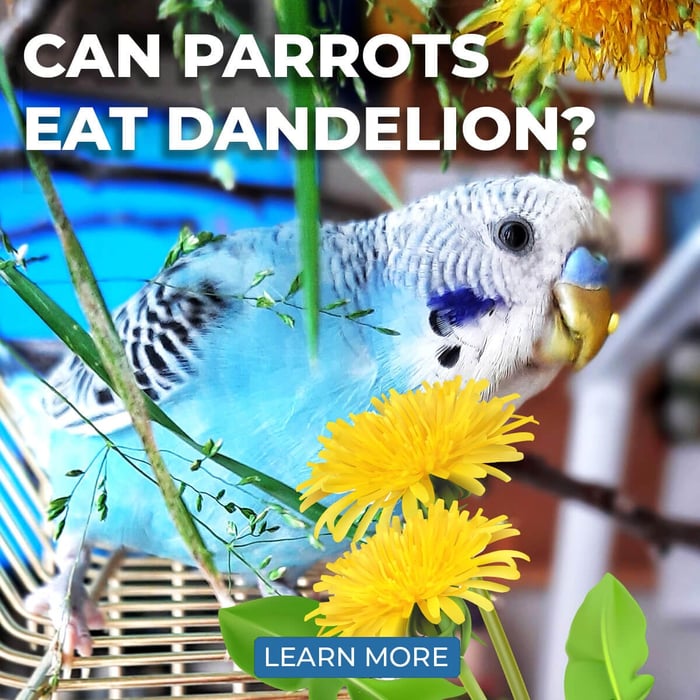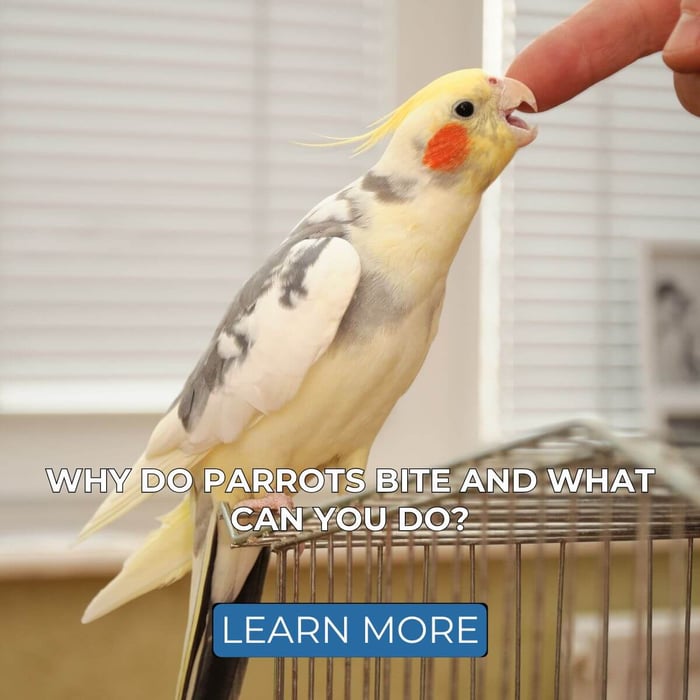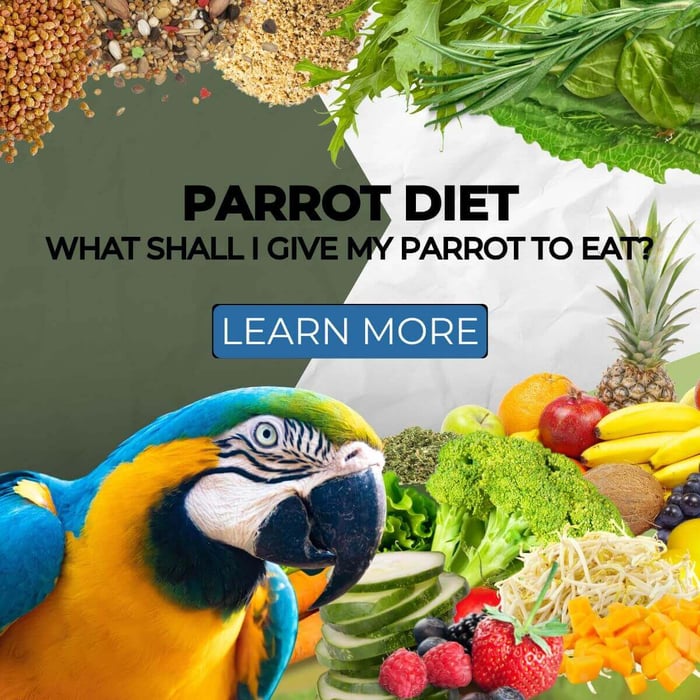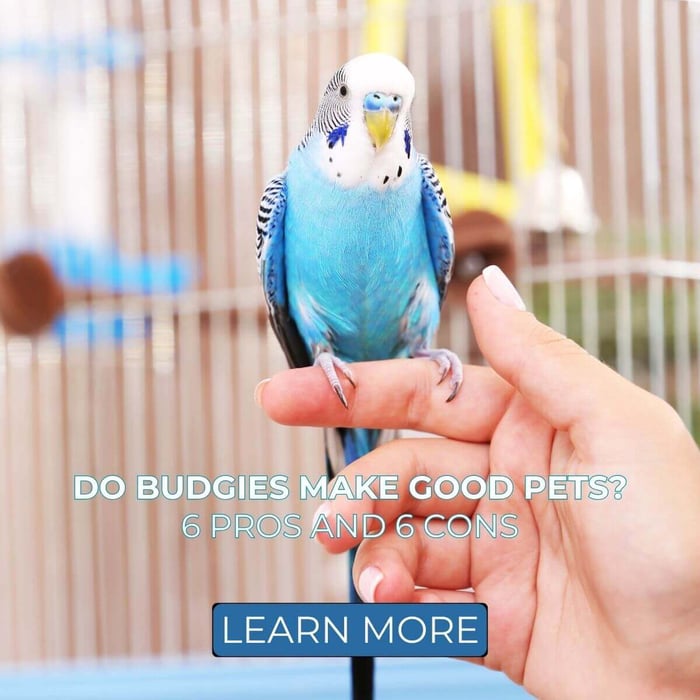Feather Plucking In Parrots - Causes & What To Do
If your parrot has suddenly started plucking its beautiful feathers and ended up with a bare chest, it can be easy to panic. What's going on?! Is your bird okay, and what can you do to make it stop? Feather plucking in parrots is a common issue, so let's have a look at what it is, what causes it, and what you can do for your bird if it has begun to pluck.
What Is Feather Plucking in Parrots?
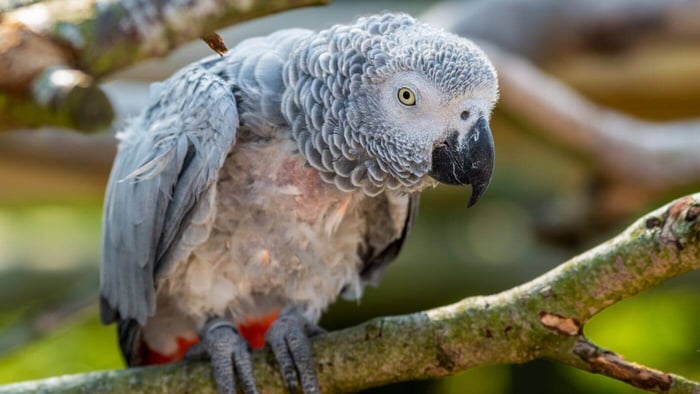
Also known as pterotillomania, feather picking or feather damaging behaviour, feather plucking is one of the most common problems seen in captive parrots. One 2016 report notes a prevalence of 10-15%! The affliction basically involves the bird either chewing or straight-up plucking its own feathers, often taking normal preening behaviours to the extreme. Sometimes, the plucking even extends to the skin itself.
Parrots that pick at their feathers will often start off looking raggedy. Depending on the type of pterotillomania, the feathers may appear split or chewed on, or you may wake up to find a bunch of them at the bottom of the cage every morning or when you get back from work. Eventually, the spots that are easiest for the bird to reach can go fully bald: chest, wings, thighs.
There is some discussion on whether certain parrot species are genetically predisposed to feather plucking, and this seems to be true to a degree. Some are more sensitive than others: African greys and cockatoos are notorious pluckers. In Amazons, there are indications that the issue can be hereditary. However, as we'll see in the section on what causes feather plucking in parrots, the problem is generally triggered by medical or environmental issues.
Cockatoos are sensitive birds and prone to feather plucking. They can spend hours chewing on their feathers, plucking themselves bald and sometimes continuing to the point of bleeding.
What Does Feather Plucking Do To A Parrot?
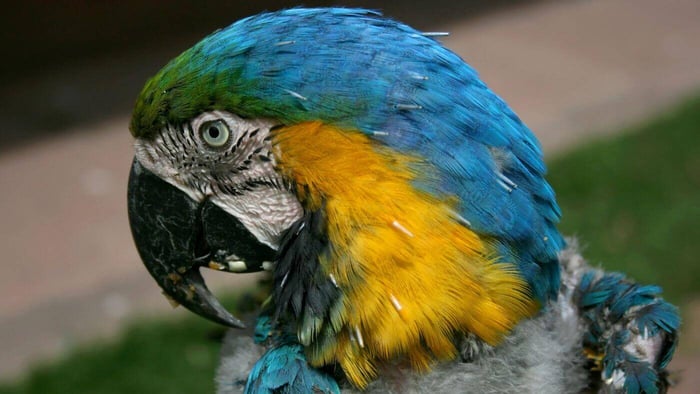
We want to emphasise that feather plucking in parrots is a problem. As we'll see below, it can be indicative of a physical medical issue or mental distress. Parrots with pterotillomania can develop secondary infections, struggle to regulate their temperature, and even bleed out – some birds pick all the way through the skin.
Unfortunately, feather picking in parrots is also addictive, and it can have irreversible consequences. Once a parrot has begun to rely on it as a coping mechanism, it can be incredibly difficult to get it to stop, even if the issue that caused it to start in the first place is resolved. In some cases, vets will even prescribe psychoactive drugs, but these don't always work, and they can have side effects.
Although birds' feathers grow back, they can't survive pterotillomania indefinitely. It's not uncommon for long-time feather pickers to destroy the feather follicles entirely in some places, meaning they have to pass the rest of their lives partially naked.
What Causes Feather Plucking in Parrots?
Medical Causes
If your parrot has started looking suspiciously bare-chested, the first thing you need to do is make an appointment with your avian vet. It's crucial to figure out whether it's feather plucking or if a different problem is affecting its plumage. If the bird is indeed plucking, underlying medical causes need to be ruled out or addressed.
There are various physical issues that can cause a parrot to start picking at its feathers, usually because they're in pain or feel itchy. These include:
- Issues that affect the skin, like mite infection, feather cysts, fungal infection (ringworm), giardia parasites (cause dryness and itchiness), skin tumours, allergies, ulcerative dermatitis or even mosquito bites
- Internal issues, like kidney, liver or pancreas problems, reproductive problems, osteoarthritis or vascular disease (birds will often pick at the painful spot)
- Viral diseases, like pox, polyoma virus PBFD (circoviruses), bornavirus
- Vitamin D deficiency due to lack of UV light
- Regular exposure to toxic fumes like cigarette smoke
- Heavy metal intoxication (zinc poisoning is common, as are rusted cage bars)
- Nutritional deficiencies
Since you're likely unable to see a vet on the same day, use the time until your appointment to watch your parrot closely. Your veterinarian will likely ask if you've seen the bird preening excessively or plucking their feathers, and any bit of information helps.
Did you know? If there are feathers missing on your parrot's head, the issue is unlikely to be feather plucking (unless it's done by a cage mate). You may need to get it tested for PBFD (parrot beak and feather disease), a contagious disease notorious for making their plumage fall out. Brooding parrots may also purposely pluck some of the feathers on their chest to help better keep their eggs warm.
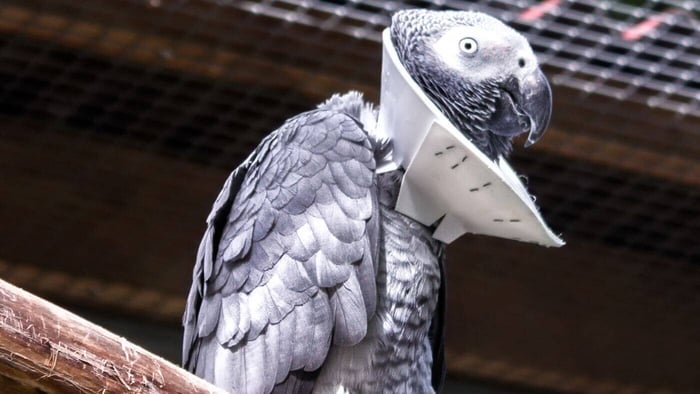
If your parrot's neck, chest or thighs start looking like this, you should visit a veterinarian.
Environmental Causes
In cases where feather plucking in parrots isn't related to some kind of medical issue, it's likely environmental. After all, our birds are very smart, but they're also quite sensitive. They need specific care to thrive, and they don't like change. It's not uncommon for a parrot to start plucking after a move, for example, but it's important to deal with the behaviour before it becomes a more permanent compulsion.
Aside from not appreciating sudden changes, parrots are also incredibly sensitive to boredom, isolation and trauma. Feather plucking is often called a "disease of captivity" for a reason: it often develops because there just aren't enough stimuli to keep your bird's smart brain busy.
All this is why feather plucking is seen more often in birds that are cage-bound, don't get to exercise, don't have enough toys, are in a cramped or small cage, and the like. It's particularly common in traumatised rescue birds, which have often spent years using it as a coping mechanism.
It's all too common for someone to get a parrot and then neglect it when they realise the amount of care and attention required to keep these birds happy. This is a recipe for feather plucking.
Did you know? Hand-raised parrots appear more prone to feather plucking (and various other issues). That's why we're proponents of letting parrots raise their own young. You can still get an affectionate and social bird even if it was raised by its parents rather than a human!
Treatment For Feather Plucking in Parrots
Removing Stressors
If your veterinarian has given your parrot a clean bill of health, the next step in addressing feather plucking in parrots is to remove any factors in its environment that may be stressing it out.
If your parrot is feather plucking, could any of the following be at play?
- Parrot is kept in a cage that is too small
- Parrot doesn't get to spend at least a few hours a day outside of its cage
- Parrot isn't getting enough attention
- Cage is dirty or overcrowded
- Parrot doesn't have enough toys
- Owner is unaware of how to handle a parrot (i.e. no punishment, no forcing it to do anything, no grabbing it)
- Parrot is stressed due to clipped wings
- Parrot doesn't have regular access to a bath
- Parrot doesn't have a stable routine/environment
- Owner fails to discourage sexual or hormonal behaviours
- Parrot is hormonal
- Air humidity is very low
- Parrot doesn't get enough sleep
Basically, it's important to inform yourself about all the different things that can stress out a pet parrot. If you identify any that apply to your situation, you should correct them.
Enrichment
Yes, it works. One of the more common reasons for a pet parrot to start plucking its feathers is boredom, so providing plenty of toys and distractions can work wonders. Keep in mind that in the wild, our birds would spend most of the day putting their smart brains to work in order to find food. They're just not made for being idle.
Research has shown time and time again that offering plenty of foraging opportunities is one of the best things you can do for your parrot. They love working for their meals, and some foraging activities can keep them busy for hours. Those are hours that your bird will be physically and mentally active rather than picking at its feathers!
Another important factor in enrichment is the social aspect. You may need to up the daily time you spend training and hanging out with your bird. If you work a regular 9-5, your parrot needs a friend. The same applies if you're home much of the day but can't or don't want to spend most of that time with your parrot.
In the wild, most parrots are never alone. Their days are spent with their mate or in flocks that can number into the hundreds. They rely on their fellow birds for both safety and fulfilment. A parrot alone in its cage is incomplete, and its stress can shave years off its lifespan – as well as cause it to start feather plucking.
Here are some other good enrichment options that can bust boredom and help distract your parrot from plucking its feathers:
- Frequently rotating parrot toy assortment
- Bathing time
- Leaving radio or TV on
- Regular training sessions, especially to reinforce healthier behaviours that don't involve preening or plucking
- Placing your parrot's cage outside so it can get some sun or taking the bird out on a harness
Diet
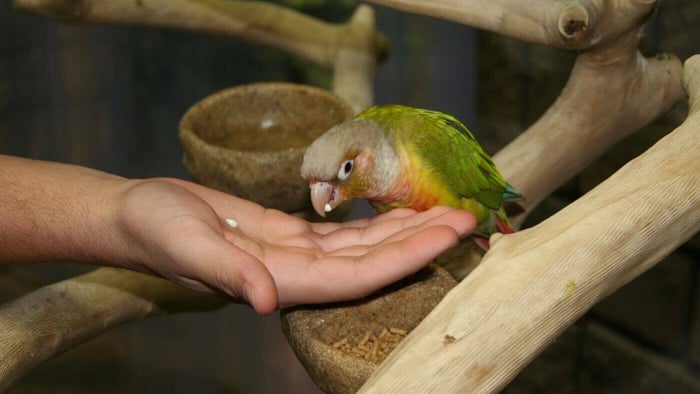
Lastly, it's important to consider that your parrot is eating a healthy diet. Food can be related to feather plucking in parrots in multiple ways: illnesses caused by malnutrition can lead to plucking, a parrot needs plenty of nutrients to grow all those feathers back, and some nutritional deficiencies (like vitamin A) appear to be directly related to this compulsion.
Have a look at our posts on the parrot diet to check whether you should change up your bird's daily meals. Basically, you'll want to feed a high-quality pellet as a staple and supplement with plenty of vegetables, some fruits and (sprouted) seeds and a variety of other fresh, healthy foods.
Feather Plucking in Parrots: Frequently Asked Questions
Should I Use A Collar On My Parrot?
There are various kinds of collars and parrot "t-shirts" for sale that prevent the bird from being able to pluck its feathers. These can be a good emergency solution, but they don't resolve underlying issues. They can also stress a parrot out even further.
My Parrots Are Plucking Each Other. What Do I Do?
In group settings like aviaries, parrots can sometimes begin to pluck their flock mates' feathers. Parent birds may also pluck their young. You should separate culprit and victim and check the list of possible stressors to see if any of them apply.
My Bird Is A Long-Time Plucker. Is There Hope?
Yes, there is. Your veterinarian should be able to guide you through the steps outlined in this article, and they may be able to offer more specific advice as well. As mentioned, collars and psychotropic medications can help with severe or chronic cases.
We know how frustrating it is to see months of feather regrowth disappear with an hour of plucking, but don't give up on your (not so) feathered pet just yet!
Conclusion
In conclusion, feather picking in parrots is an obsessive and addictive behaviour used to manage their stress levels or in an attempt to get rid of some kind of pain or discomfort. Although it's not necessarily something that's the owner's fault – especially in rescue birds – it is an indication that something is wrong.
If your parrot is plucking its feathers, your first step should always be to take it in for a check-up with an avian vet. They can rule out medical causes or begin treatment, hopefully putting your bird on the path to (mental) recovery. But remember: curing a parrot of feather plucking can be a long and difficult road. Don't give up!

